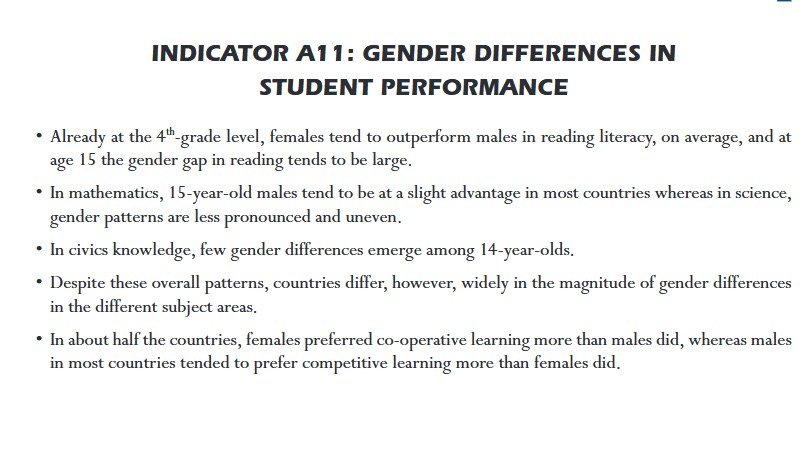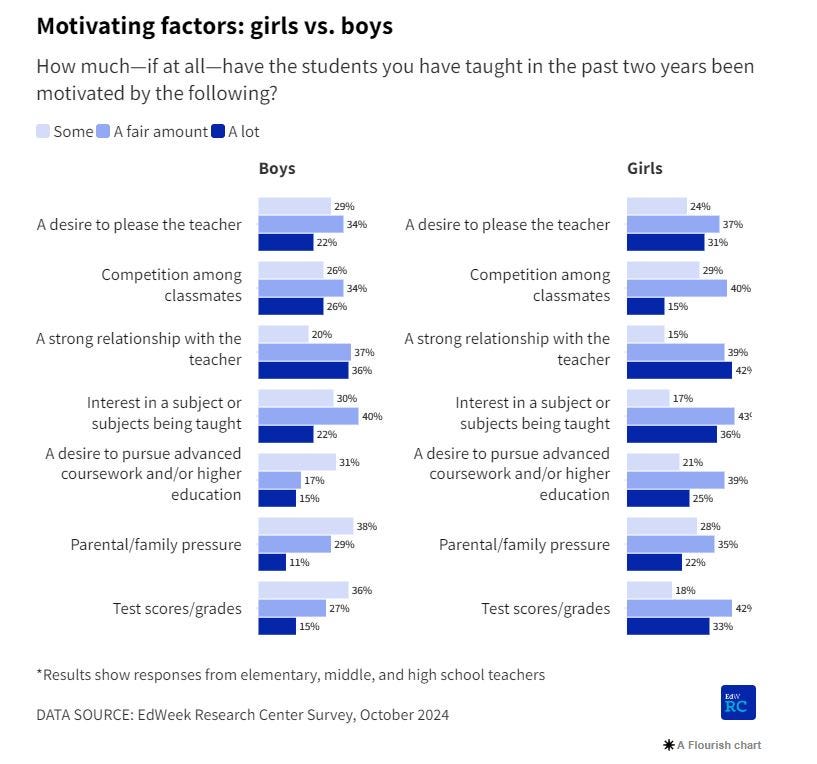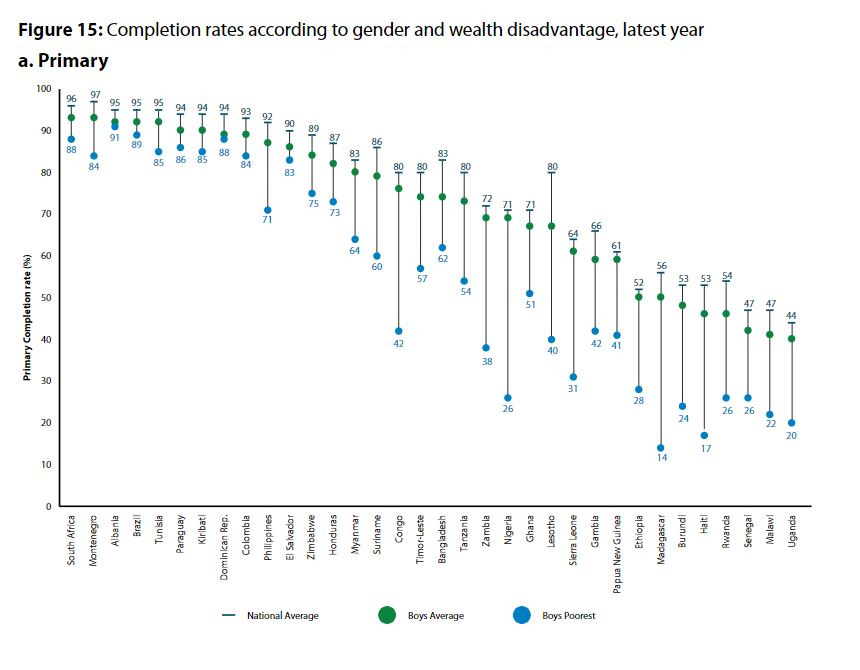Are Boys bad at school?
The panic over boys and education is raging again. Are the solutions worth their weight in salt? I'm looking at you Richard Reeves.
One of the more argued about issues that we talk about in regards to masculinity, and how to support men and boys is how boys are treated in school. There are countless of articles, countless of media, and countless of discourse around the idea that school just doesn’t work for boys. And because of this, we have concluded that we have to change school so more boys can succeed in school.
The solutions are vast, varied, and some are willing to turn the whole system around so we can help boys succeed in school. I feel like I know where the urgency comes from, but this has been a topic of discussion for decades now. In fact in 2003, UNESCO published a report called Education at a Glance which takes an overall view of how males and females fare through literacy in different subjects (math, science, arts, humanities etc). Here were some of the results back then:
Overall this is a comprehensive look outside of North America, which is good because sometimes (most of the time), these conversations are so United States centric that it’s exhausting. It’s impossible to look at this issue critically without the right data.
However even now in 2025, we can find the statement “Are Boys bad at school?” to be pretty accurate. UNESCO in 2023 released a document titled “Leave no Child Behind” which highlights the world wide problem. However although there is a universal problem of boys enrolment in school and with boys not doing well in school, UNESCO cautions:
“Boys are not a homogeneous group. Not all boys disengage from education or are disadvantaged. Evidence from high-income countries point to wider variations in educational outcomes among boys than girls. The literature also points to the need to recognize the importance of intersectionality, considering how gender intersects with poverty, location, disability, ethnicity, language, migration, displacement, incarceration, religion, sexual orientation, and gender identity and expression and how this compounds disadvantage.
The question thus becomes which boys require support” (emphasis theirs)
The problem that I’m seeing is that a lot of pundits and writers look at these results, especially local results, and try to provide a universal view of what we should do for boys. Especially writers like Richard Reeves.
Richard Reeves is the author of the book “Of Boys and Men” and has shown up with a quote whenever anyone talks about masculinity. Reeves has been very particular about the lack of proper boys education and that has spurned a lot of op-eds. Again, as stated prior, this is not a new issue. But the way Reeves presents it, it becomes more provocative. For example he posits that talking about boys education was taboo (not true, we have been talking about this for decades now):
“Even so, I have been reluctant to write this book. I have lost count of the number of people who advised against it. In the current political climate, highlighting the problems of boys and men is seen as a perilous undertaking.” — Reeves “Of Boys and Men”
That leftists have issues with it (a straw man if I ever saw one):
“Progressives refuse to accept that important gender inequalities can run in both directions, and quickly label male problems as symptoms of “toxic masculinity.” — Reeves “Of Boys and Men”
And that he’s the enlightened centrist that just wants to help (just like prior enlightened centrists before him):
“The Left tells men, “Be more like your sister.” The Right says, “Be more like your father.” Neither invocation is helpful. What is needed is a positive vision of masculinity that is compatible with gender equality. As a conscientious objector in the culture wars, I hope to have provided an assessment of the condition of boys and men that can attract broad support.” —- Reeves, “Of Boys and Men”
What Reeves doesn’t know, or at least fails to acknowledge, is that he is not the only voice speaking about this, and that his view that we just need a “positive vision of masculinity” has been debated since as long as I have heard studied masculinities (more than a decade now).
This is such a tiring trope, the idea that the person writing the book can see ‘both’ sides even though they are a generalized view of both sides, and that he’s the only one with the answers. Maybe a bit of “toxic masculinity” on his end, even though Reeves would hate that I use that term at all (one day I will write a post about why the term Toxic Masculinity is not actually bad, nor does it drive away people like Reeves claims).
But enough about Reeves and his book (I’ll talk about his book a lot later, stay tuned), let’s dig into his idea of helping boys specifically with education.
One of Reeves more ballyhooed ideas was of making boys enter school a year behind because he claims that boys overall mature slower than girls. This is called “redshirting” and Reeves specifically says that individually some parents do this already (I personally have seen this as well), his solution is a more systemic view of redshirting. By the way, this was also a similar theory that Malcolm Gladwell posits in “Outliers” and was heavily debated at that time as well. When Gladwell argued for it, he wasn’t talking about boys at all, he was talking about it in general (also, as a general rule I always take a little bit of side eye when I see Gladwell argue for something). Does Reeves think it will work? From Reeves himself:
“Would a delayed start for boys narrow the gender gap? I don’t know for sure. Such a significant change in education policy is hard to evaluate in advance. But the evidence from studies of redshirting makes me hopeful that it could help quite a lot. A raft of studies of redshirted boys have shown dramatic reductions in hyperactivity and inattention through the elementary school years, higher levels of life satisfaction, lower chances of being held back a grade later, and higher test scores” — Reeves, “Of Boys and Men”
Ok let’s take a look at some other research. This is from Education Next where they have stated specifically that Redshirting may work in the short term but long term it’s negligible (“In fact, a balanced look at the research suggests that while children derive a short-term gain from being redshirted, that advantage dissipates quickly over time.”) . Redshirting has actually been around for a long time, maybe since the 1980’s, this is not a new thing that Reeves argues for, and there has been a mountain of research that comes with it. However the one thing that gives me pause about redshirting is an issue that Reeves in his classic liberal fashion, tries to cut off at the pass, that this would cause parents to provide an extra year of child care. What was Reeves anwser for this? Well it’s more school!
“My proposal is to enroll boys in a universal pre-K program at the same age as girls but give them an extra year before they move on. In other words, boys would get a double dose of pre-K.” — Reeves, “Of Boys and Men”
What are we talking about here? Most pre-K that I know of is just child care, paid for privately or done domestically. And it connects directly to what Reeves mentioned in the book, that lower-income families will less likely redshirt even if they thought it was beneficial. In another study, it also shows that the reason why some families “redshirt” have little to do with academic achievement. In a Stanford paper that followed families as they were redshirting kids, it states that: “The absence of a relationship between nearly all of the developmental measures and the likelihood of delayed kindergarten entry suggests parents’ decisions to red-shirt may be driven more by concerns about their child’s relative age or relative physical development in their classroom than by their actual cognitive or behavioral development.”
So to recap, redshirting, we don’t know if it will work. The studies are inconclusive. If we do redshirt then the problems that it may cause, it would need more school to solve. And this doesn’t argue the personal aspect of that child who is redshirted. When this posted on a subreddit r/MensLib, there’s one comment that struck me:
This message not only is relevant for children, but specifically for boys. Boys for a long time in school get shown that they are “lesser than.” Either through messages that they fidget too much, that their relationships are not as strong, that they are not as smart, and that we need to watch out for them. This is specially more relevant for children who are not white, especially black and brown children. I can’t even imagine the possible harm it may cause when they were told they had to put in school later than others.
There are some really interesting use cases for redshirting a child, for example developmental delays, possible social cohesion, more parental care. However I do think it is on a one to one basis, and as a universal approach I don’t know if it will help boys at all. At least we don’t know it will for sure.
Let’s talk about another issue.
EdWeek publication ran a bunch of articles stating that school isn’t working for boys, and it’s an interesting article, and a lot of the solutions that they posit not only are helpful for boys overall, I think would just be helpful in general. Again the lens is around boys though and the differences homogenously of how they differ with girls. So take that with a grain of salt. One of the ones that I spoke about before on Modern Manhood, was the issue of motivation:
With this data that EdWeek gathered, it shows motivating factors to be similar except for one or two things. One of them being Test Scores, and the other is Parental/family pressures. Note that a desire to please the teacher was about even, which is notable because one of the biggest planks in a lot of people who views boys education as critical, is the lack of male teachers. And that male teachers would make it so school would be more relatable for boys, and therefore boys will have better outcomes.
No disrespect to those researchers, and I also think that having more male teachers is a good thing, there is a lot written about the gender gap in education, although why is it important that is is more to vibes I guess? More to do with breaking down gender norms than helping boys do well in school, because those cases are debatable at best (even Reeves agrees with me here: “While the evidence that male teachers matter is strong, the precise mechanisms are not well understood. Attitudes may be one factor.”)
However the claims that Reeves makes in his book are dubious. Reeves claims that, for example, having more male teachers in English will help boys have better grades in English. Yet in 2006, University of Alberta researcher Dr Janice Wallace states that: “studies show that having more male teachers will not greatly affect boys’ test scores. However, there is ample research to indicate that low socio-economic status, family history, family supports, and peer group influences have an impact on test results.”
Another German research also states clearly that: “The evaluation of within school variation, however, which controls for school fixed effects, identifies virtually no effects of teacher gender at the end of elementary school (grade 4, age 10) on either the teachers’ recommendations for middle school type choice or the actual school type choice (in Germany’s early tracking system).” And also that: “The findings in this paper, therefore, should allay the concerns expressed in the global press that the increasing feminization of elementary school education might harm boys.”
Having more male teachers in general is a good, and I believe that to be true, but to make claims that it will help boys achieve better scores or complete school better than before is still to be determined. And even then it’s still considered on a one to one basis, I personally have had many male teachers who were a gong show to be around and I had a much more pleasurable experience with a lot of my female teachers.
Ok I want to make it clear here that I’m not against making school better for boys, but at the same time, I do think some critical analysis needs to happen and not the bulldozing way Reeves talks about boys education. Because family history, family support, and socio-economic status are much more of a factor with grades and attendance than anything to do with gender. The UNESCO report states this clearly:
“Globally, poverty is perhaps the most significant predictor of low achievement and dropout. While the gender dimensions of the causes and effects of poverty differ, household poverty has been identified as being the key factor, above all else, that affects the chances of completion of primary and secondary education for both boys and girls (Rose et al., 2017)”
If you look at the chart, the gap between completion between the poorest boy v/s the richest boy is so vast in some countries that it’s much more worthy of the panic than of boys education. This according to UNESCO happens due to lower working ages (gender norms), the fact that there are more boys who are child laborer than girls, especially during economic hardships. In fact you may see a greater increase in boys attending school when they are given simple things as lunches:
Or it may mean that boys (or any child) should be working after school, this is especially important for poorer families. The UNESCO report is fascinating because 1) it doesn’t focus on the US, it focuses on countries that have a lesser economy and 2) you can use those same lessons and apply them everywhere. Where the lesson is “I have to raise the cattle after school” means working after school is an impact. Where the lesson is “fewer employment opportunities that require post secondary qualifications” you can easily apply that to Western (ie, white) countries. UNESCO agrees that Boys education overall is suffering, but it doesn’t come to the same conclusions as Reeves and others do. It sticks to the tried and true method that providing a better social safety net will be a benefit to all, including boys.
Overall, I think it’s notable that boys are leaving school more often than girls are, and this IS a world wide phenomenon. But I urge people who write about this, think about this, and op-ed about this, to look beyond the homogenous group and look at the major driving forces to specific boys rather boys over all.
Men and Boys are not all the same, and we should stop writing like they are.











I noticed you avoided talking about the fact that K-12 teachers in the West discriminate against boys when it comes to grading. That's the root of the problem - teachers just like it less when boys succeed, and find boys who act out or who don't come from the "right" (white, white-collar) families succeeding in their classrooms to be a threat.